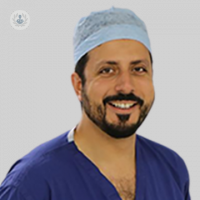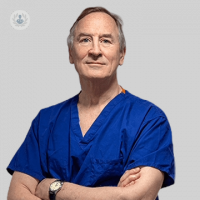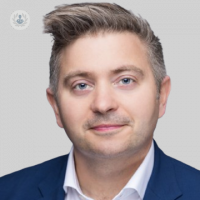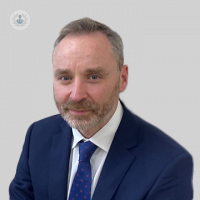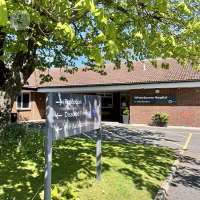What is a traumatic injury?
A traumatic injury is a physical injury which occurs suddenly, with a certain degree of severity. These types of injury typically require immediate medical attention and may first be dealt with in A&E, with later referral to a particular specialist if ongoing treatment is needed or rehabilitation is necessary. Major trauma has the potential to be severe, causing disability, or in extreme cases, death. Trauma is the most common cause of death in adults under 40 in the UK.

What causes traumatic injuries?
Trauma can be caused by a variety of external forces which affect the body. Some of the most common causes of traumatic injury include road traffic accidents, falls, violence, sports injuries, and penetration (e,g stab wounds, bullets). In the UK, falls are one of the most common causes of traumatic injury, as the ageing population are more likely to experience a fall. In England and Wales a fall is the most common type of major trauma, overtaking road traffic accidents as the main cause.
How are traumatic injuries treated?
In cases of major trauma, where injuries are multiple and serious in nature, the patient will typically be taken to a trauma centre, where multi-disciplinary teams including anaesthetists, orthopaedic surgeons, neurosurgeons, and emergency doctors work to quickly deal with the injuries. Surgery may be immediate, in order to reduce the possibility of disability/death.
If the traumatic injury is not life-threatening, it will most likely first be dealt with in A&E, then referred to a specialist doctor if necessary. Surgery may be necessary to treat the injury, followed by physical therapy in many cases in order to achieve rehabilitation.
Which specialist treats traumatic injuries?
The specialist treatment will depend on the injury in question. Bone fractures, for example, will be treated by an orthopaedic surgeon/traumatologist, while brain injuries will be treated by a neurosurgeon.
05-24-2017 04-06-2023Traumatic injury
Mr Ibraheim El-Daly - Orthopaedic surgery
Created on: 05-24-2017
Updated on: 04-06-2023
Edited by: Aoife Maguire
What is a traumatic injury?
A traumatic injury is a physical injury which occurs suddenly, with a certain degree of severity. These types of injury typically require immediate medical attention and may first be dealt with in A&E, with later referral to a particular specialist if ongoing treatment is needed or rehabilitation is necessary. Major trauma has the potential to be severe, causing disability, or in extreme cases, death. Trauma is the most common cause of death in adults under 40 in the UK.

What causes traumatic injuries?
Trauma can be caused by a variety of external forces which affect the body. Some of the most common causes of traumatic injury include road traffic accidents, falls, violence, sports injuries, and penetration (e,g stab wounds, bullets). In the UK, falls are one of the most common causes of traumatic injury, as the ageing population are more likely to experience a fall. In England and Wales a fall is the most common type of major trauma, overtaking road traffic accidents as the main cause.
How are traumatic injuries treated?
In cases of major trauma, where injuries are multiple and serious in nature, the patient will typically be taken to a trauma centre, where multi-disciplinary teams including anaesthetists, orthopaedic surgeons, neurosurgeons, and emergency doctors work to quickly deal with the injuries. Surgery may be immediate, in order to reduce the possibility of disability/death.
If the traumatic injury is not life-threatening, it will most likely first be dealt with in A&E, then referred to a specialist doctor if necessary. Surgery may be necessary to treat the injury, followed by physical therapy in many cases in order to achieve rehabilitation.
Which specialist treats traumatic injuries?
The specialist treatment will depend on the injury in question. Bone fractures, for example, will be treated by an orthopaedic surgeon/traumatologist, while brain injuries will be treated by a neurosurgeon.


Pelvic and acetabular fractures: A detailed guide to surgery and recovery
By Mr Ibraheim El-Daly
2024-12-30
Revered consultant trauma and orthopaedic surgeon Mr Ibraheim El-Daly gives an all-you-need-to-know guide to pelvic and acetabular fractures, including surgical intervention and the recovery period to follow. See more


How to heal a fracture
By Mr Rohit Madhav
2024-12-30
Orthopaedic assistance is needed after a fracture to not only make sure that the bone heals correctly, but also to ensure that the original mobility is restored. Mr Rohit Madhav explains the body's response to a broken bone, the most common types of fractures and treatment options available. See more


What are the most common bursa injuries in sports?
By Mr Jonathan Walczak
2024-12-29
A bursa injury - also known as bursitis - is one of the most common injuries in sports and can affect several parts of the body. Orthopaedic and trauma surgeon, Mr Jonathan Walczak, tells us what some of the most common bursa injuries are and what the recommended treatment is. See more
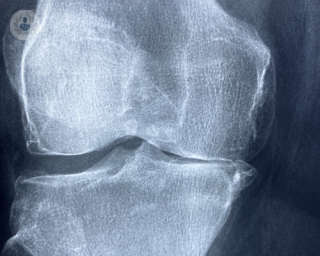

What is an orthopaedic trauma?
By Mr Ahmed Magan
2024-12-29
Orthopaedic trauma refers to severe injuries to the musculoskeletal system, including bones, joints, ligaments, muscles, and tendons. These injuries typically result from accidents or events involving high impact, such as car accidents, falls from significant heights or sports-related incidents. Orthopaedic trauma can range from simple fractures or dislocations to complex injuries involving multiple broken bones and damaged soft tissues. Leading consultant orthopaedic surgeon Mr Ahmed Magan takes a detailed look at orthopaedic trauma in this article, considering diagnosis and treatment alongside recovery and rehabilitation in expert detail. See more
Experts in Traumatic injury
-
Mr Jonathan Lucas
Paediatric orthopaedicsExpert in:
- Traumatic injury
- Paediatric orthopaedics
- Scoliosis
- Sport growth factors
- Sports injuries
- Spinal surgery
-
Mr Amol Chitre
Orthopaedic surgeryExpert in:
- Hip replacement
- Revision hip replacement
- Knee replacement
- Hip
- Traumatic injury
- Knee
-
Mr Thomas Hester
Orthopaedic surgeryExpert in:
- Traumatic injury
- Foot and ankle
- Minimal access surgery (keyhole surgery)
- Fractured ankle
- Sports injuries
- Foot arthrodesis
-
Mr Joby George Malal
Orthopaedic surgeryExpert in:
- Shoulder surgery
- Elbow Pain
- Hand injury
- Wrist fracture
- Joint replacement
- Traumatic injury
-
Mr Colin Senior
Orthopaedic surgeryExpert in:
- Shoulder
- Shoulder arthroscopy
- Shoulder replacement
- Sports injuries
- Traumatic injury
- Rotator cuff injury
- See all

The Portland Hospital - part of HCA Healthcare
The Portland Hospital - part of HCA Healthcare
205 - 209 Great Portland St. W1W 5AH
No existe teléfono en el centro.
By using the telephone number provided by TOP DOCTORS, you automatically agree to let us use your phone number for statistical and commercial purposes. For further information, read our Privacy Policy
Top Doctors

The Winterbourne Hospital - part of Circle Health Group
The Winterbourne Hospital - part of Circle Health Group
Herringston Rd, Dorchester DT1 2DR
No existe teléfono en el centro.
By using the telephone number provided by TOP DOCTORS, you automatically agree to let us use your phone number for statistical and commercial purposes. For further information, read our Privacy Policy
Top Doctors

Cleveland Clinic London Hospital
Cleveland Clinic London Hospital
33 Grosvenor Place
No existe teléfono en el centro.
By using the telephone number provided by TOP DOCTORS, you automatically agree to let us use your phone number for statistical and commercial purposes. For further information, read our Privacy Policy
Top Doctors
-
The Portland Hospital - part of HCA Healthcare
205 - 209 Great Portland St. W1W 5AH, Central LondonExpert in:
- Neurological spinal surgery
- Orthopaedic spinal surgery
- Maternity care
- Pregnancy
- Scoliosis
- In vitro fertilisation (IVF)
-
The Winterbourne Hospital - part of Circle Health Group
Herringston Rd, Dorchester DT1 2DR, DorchesterExpert in:
- Hip
- Cataracts
- General Surgery
- Orthopaedic surgery
- Physiotherapy
- Knee
-
Cleveland Clinic London Hospital
33 Grosvenor Place, Central LondonExpert in:
- Cardiology
- Colorectal surgery
- Minimal access surgery (keyhole surgery)
- Gallbladder surgery
- Diagnostic Imaging
- Ultrasound
- Most viewed diseases, medical tests, and treatments
- Ulnar nerve entrapment
- Peripheral nerve block
- Peripheral neuropathy
- Joint pain
- Lumbar herniated disc
- Spinal surgery
- Minimal access surgery (keyhole surgery)
- Shoulder pain
- Osteoporosis
- Botulinum toxin (Botox™)
